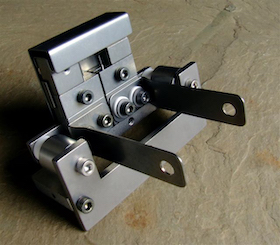Advanced Mass Spectrometry for Biomarker Discovery for Early Detection of Kidney Injury
Dr. Megha Agrawal and Dr. Shyamasri Biswas






People say the Gold Upsilon Sputtering Target from DHF Technical Products looks like a lot of things: A picture frame. A box. A rectangle. But if you look closely, you can also see part of a horseshoe. Which makes sense because the Upsilon Target has been essential in helping the workhorse of sputtering systems from MRC run beautifully for decades.
Zinc metal batteries (ZnBs) are poised as the next-generation energy storage solution, complementing lithium-ion batteries, thanks to their cost-effectiveness and safety advantages. These benefits originate from the abundance of zinc and its compatibility with non-flammable aqueous electrolytes. However, the inherent instability of zinc in aqueous environments, manifested through hydrogen evolution reactions (HER) and dendritic growth, has hindered commercialization due to poor cycling stability. Enter potassium polyacrylate (PAAK)-based water-in-polymer salt electrolyte (WiPSE), a novel variant of water-in-salt electrolytes (WiSE), designed to mitigate side reactions associated with water redox processes, thereby enhancing the cyclic stability of ZnBs. In this study, WiPSE was employed in ZnBs featuring lignin and carbon composites as cathode materials. Our research highlights the crucial function of acrylate groups from WiPSE in stabilizing the ionic flux on the surface of the Zn electrode. This stabilization promotes the parallel deposition of Zn along the (002) plane, resulting in a significant reduction in dendritic growth. Notably, our sustainable Zn-lignin battery showcases remarkable cyclic stability, retaining 80% of its initial capacity after 8000 cycles at a high current rate (1 A g−1) and maintaining over 75% capacity retention up to 2000 cycles at a low current rate (0.2 A g−1). This study showcases the practical application of WiPSE for the development of low-cost, dendrite-free, and scalable ZnBs.
Members are the engine that makes the NSTC run. NSTC membership is as diverse as the industry it represents, and it spans the entire semiconductor ecosystem. This pivotal platform brings together semiconductor companies, academic research institutions, governments, workforce organizations, and others to collaborate and propel the U.S. semiconductor industry forward.
In just two neutron experiments, scientists discovered remarkable details about the function of an enzyme that can aid drug design for aggressive cancers. The scientists, working at the Department of Energy’s Oak Ridge National Laboratory, used neutron scattering at the Spallation Neutron Source and the High Flux Isotope Reactor to identify exact atomic-scale chemistry in serine hydroxymethyltransferase, or SHMT, a metabolic enzyme necessary for cell division.







Since 2000 Vacuum Technology & Coating Magazine has been the industry's leading source for the latest articles, news, and product and service information. Below we describe some of the terms that you will find in a typical issue of VT&C.
Vacuum Coating (Vacuum Deposition and Thin Film Deposition) is the process of depositing a film or other material atom by atom or molecule by molecule onto a surface in a low pressure environment or vacuum.
Physical Vapor Deposition or PVD refers to vacuum deposition methods which involve the material (which is being deposited) going from a condensed phase to a vapor phase and then to a thin film condensed phase. Sputtering and evaporation are common PVD processes.
Sputtering refers to a type of process used to deposit thin films and employs a plasma to bombard and eject atoms from a target source.
Evaporation refers to the heated source material being evaporated in a vacuum. Vacuum allows vapor particles to travel directly to the target object, where they condense back to a solid state. (called a Deposition Source) refers to a type of process used to deposit thin films and employs a plasma to bombard and eject atoms from the target source (called a Deposition Source).
Vacuum Hardware refers to the types of hardware and components that are used in the vacuum process. There are many types of hardware used in this process, some examples are flanges, fittings, seals, valves, and chambers.
Thin Film Metrology involves determining the optimal thickness, composition and/or condition of a coating through various techniques and mathematical calculations.
Gas Analytical Systems are used in the analysis of residual gases within a low pressure environment or vacuum.
Vacuum Pumps are devices that remove gas atoms and molecules for the purpose of leaving behind a partial vacuum. Some examples of types of vacuum pumps are rotary vane pumps, diaphragm pumps, and scroll pumps.
Every issue of VT&C includes a product showcase focused on a specific topic relevant to Vacuum Processing, please see our editorial calendar which lists the topic for each issue.